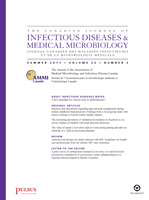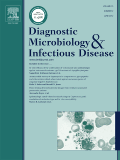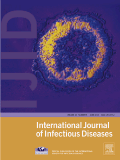
Canadian Journal of Infectious Diseases & Medical Microbiology
Scope & Guideline
Elevating the discourse on infectious diseases and microbiology.
Introduction
Aims and Scopes
- Infectious Disease Epidemiology:
The journal publishes studies that analyze the patterns, causes, and effects of infectious diseases within populations, contributing to public health strategies and interventions. - Microbial Resistance and Treatment Strategies:
Research on antimicrobial resistance, including the mechanisms of resistance and novel therapeutic approaches, is a key focus area, reflecting the urgent need to address drug-resistant infections. - Clinical Microbiology and Diagnostics:
The journal emphasizes advancements in diagnostic techniques for infectious diseases, including molecular methods and their implications for patient management. - Public Health and Preventive Medicine:
Articles addressing public health challenges, vaccination strategies, and preventive measures against infectious diseases are integral to the journal's mission. - Innovative Therapeutics and Interventions:
The journal highlights research on new treatments, including pharmacological interventions and traditional medicine approaches, aimed at improving outcomes in infectious diseases. - Global Health Perspectives:
The journal also encompasses studies that explore infectious diseases in diverse geographic and socioeconomic contexts, contributing to a global understanding of health disparities.
Trending and Emerging
- COVID-19 Research and Impacts:
A significant surge in COVID-19-related studies illustrates the journal's responsiveness to the pandemic, covering various aspects such as treatment outcomes, vaccine efficacy, and long-term health effects. - Antimicrobial Resistance (AMR) Awareness:
In line with global health priorities, there is an increasing emphasis on antimicrobial resistance, with more studies exploring resistance mechanisms, epidemiology, and innovative solutions to combat AMR. - Integrative Approaches to Infection Management:
Emerging research is focusing on integrative treatment approaches, combining traditional and modern medicinal practices, particularly in managing viral infections and complex cases. - Impact of Climate Change on Infectious Diseases:
Recent publications are beginning to explore the links between climate change and infectious disease patterns, a critical area as global warming continues to influence disease spread. - Mental Health Impacts of Infectious Disease Outbreaks:
There is a growing recognition of the psychological effects of infectious diseases on healthcare workers and patients, leading to more studies addressing mental health in the context of epidemics.
Declining or Waning
- Traditional Antibiotics and Treatment Protocols:
There seems to be a reduction in papers focusing on traditional antibiotics and established treatment protocols, as the field increasingly shifts towards exploring novel therapies and addressing antimicrobial resistance. - General Virology Studies:
The volume of research dedicated to general virology, outside of specific viral outbreaks like COVID-19, appears to be decreasing, possibly due to a more focused interest in pathogens with significant public health impact. - Invasive Fungal Infections:
Research on invasive fungal infections has seen a decline, potentially overshadowed by the urgent need to address bacterial resistance and viral infections in the context of the COVID-19 pandemic. - Studies on Non-communicable Diseases Related to Infectious Agents:
There has been a noticeable decrease in studies examining the relationships between infectious agents and chronic non-communicable diseases, as the journal's focus shifts more towards acute infectious diseases.
Similar Journals

GERMS
Enhancing public health through collaborative research initiatives.GERMS is a multidisciplinary journal published by the EUROPEAN ACAD HIV-AIDS & INFECTIOUS DISEASES, dedicated to advancing knowledge in the fields of epidemiology, immunology, infectious diseases, and microbiology. Since its inception in 2011, the journal has provided a crucial platform for researchers and practitioners to share innovative studies, clinical findings, and public health insights, with an eye on improving health outcomes globally. With an ISSN of 2248-2997 and a consistent publication trajectory leading up to 2024, GERMS is recognized in the third quartile across several categories, reflecting its growing impact and relevance in the scientific community. Authors and readers benefit from a range of access options, fostering the dissemination of vital research findings. As a journal situated in Romania, it also addresses regional health challenges while contributing to the broader discourse on infectious diseases and public health. GERMS is not just a repository of knowledge, but a vital resource for those engaged in combating infectious diseases and promoting health equity.

Yakut Medical Journal
Advancing medical knowledge in the heart of Siberia.Yakut Medical Journal is a peer-reviewed academic journal published by the Russian Academy of Sciences, Siberian Branch, dedicated to advancing knowledge in the field of medicine and health sciences. With its ISSN number 1813-1905 and E-ISSN 2312-1017, this journal serves as a vital platform for researchers and professionals in Siberia and beyond, fostering the dissemination of original research, case studies, and reviews that address the unique medical challenges and innovations in this region. Although it operates under a traditional publishing model, Yakut Medical Journal is committed to upholding high academic standards, ensuring all submissions are rigorously peer-reviewed to maintain the integrity of published work. The journal aims to bridge gaps in medical research and practice through its scope, which encompasses a wide range of medical disciplines, thereby engaging a diverse audience including researchers, medical educators, and practitioners looking to stay at the forefront of medical advancements. For those keen on contributing to the field or seeking current insights, Yakut Medical Journal represents a significant addition to the body of scholarly resources available in medical literature.

mBio
Championing rigorous research in microbiology and virology.mBio is a premier, peer-reviewed open-access journal published by the American Society for Microbiology, dedicated to advancing the field of microbiology and virology. With an impressive impact factor and a commendable standing within the top quartiles (Q1) of both microbiology and virology categories as of 2023, mBio offers a dynamic platform for researchers and professionals to disseminate high-quality, rigorous scientific findings. Since its inception in 2010, it has served as a vital resource for the global scientific community, facilitating open access to groundbreaking research that spans diverse topics within microbiology. With a Scopus ranking of #28 out of 182 in Microbiology and #16 out of 80 in Virology, mBio significantly influences ongoing research trends and informs best practices in the field. Its commitment to open-access publishing allows for widespread visibility and accessibility, ensuring that critical discoveries reach a broad audience, including students and academics eager to contribute to, and learn from, cutting-edge science.

Reviews and Research in Medical Microbiology
Delivering High-Impact Research for Healthcare ProfessionalsReviews and Research in Medical Microbiology is a premier academic journal published by LIPPINCOTT WILLIAMS & WILKINS, focusing on groundbreaking research and comprehensive reviews that advance the understanding of medical microbiology. With an ISSN of 2770-3150 and an E-ISSN of 2770-3169, this journal serves as an essential resource for researchers, healthcare professionals, and students dedicated to the study of pathogens, infectious diseases, and microbial mechanisms affecting health. While the journal currently does not offer open access, its rigorous peer-review process ensures that only high-quality, impactful research is disseminated to the scientific community. The journal aims to bridge gaps in knowledge by presenting cutting-edge studies that explore novel therapeutic strategies, diagnostic methods, and the evolving landscape of microbial resistance. Nestled in the heart of Philadelphia, this journal proudly contributes to the advancement of medical microbiology and is an indispensable platform for the publication of critical findings that shape clinical practices and research trajectories in the field.

Annals of Clinical Microbiology and Antimicrobials
Connecting researchers to the latest advancements in infectious diseases.Annals of Clinical Microbiology and Antimicrobials, published by BMC, is a leading open-access journal that has been fostering scientific discourse in the fields of microbiology and infectious diseases since its inception in 2002. With an established reputation for excellence, this journal is positioned in the prestigious Q1 category across multiple disciplines, including Infectious Diseases, Medicine (miscellaneous), and Medical Microbiology as of 2023. This journal serves as a vital platform for researchers, healthcare professionals, and students, promoting the latest advancements in clinical microbiology and antimicrobial research. Access to its invaluable content is open to all, reflecting the commitment to disseminate knowledge universally. The Annals of Clinical Microbiology and Antimicrobials is based in the United Kingdom and continues to pave the way for innovation and discussions that shape the future of clinical practices in microbiology.

DIAGNOSTIC MICROBIOLOGY AND INFECTIOUS DISEASE
Exploring Innovations in Diagnostic MicrobiologyDIAGNOSTIC MICROBIOLOGY AND INFECTIOUS DISEASE, published by Elsevier Science Inc, is a leading journal in the fields of Infectious Diseases, Microbiology, and Medicine. Since its inception in 1983, this esteemed journal has consistently provided a platform for original research and comprehensive reviews that advance the understanding of diagnostic microbiology and its implications for infectious diseases. With an impressive impact factor placing it in the Q2 category in multiple relevant fields as of 2023, it stands out with Scopus rankings reinforcing its significance in academia, ranking #136 out of 344 in Infectious Diseases and #64 out of 140 in Medical Microbiology. This journal is essential for researchers, healthcare professionals, and students who seek to stay abreast of the latest developments and trends in infectious diagnostics. DIAGNOSTIC MICROBIOLOGY AND INFECTIOUS DISEASE is committed to fostering excellence in research quality and academic rigor, ensuring accessibility to vital knowledge for addressing some of the most pressing health challenges of our time.

Jundishapur Journal of Microbiology
Nurturing a community dedicated to microbial discovery.Welcome to the Jundishapur Journal of Microbiology, a peer-reviewed publication dedicated to advancing the field of microbiology. Published by BRIEFLAND, this journal focuses on key areas such as infectious diseases and medical microbiology, offering a platform for researchers to share their findings from 2009 to 2024. Despite its current positioning in Quartile 4 across various categories in 2023, the journal provides a valuable resource for budding scientists and established professionals alike, contributing to the growing body of knowledge in these critical areas. While it is not an open-access journal, the Jundishapur Journal prioritizes the dissemination of research in the Netherlands, facilitating a deeper understanding of microbial science and its implications for public health. Join a community of innovators committed to exploring both emerging and established themes in microbiology.

INFECTION
Advancing the Science of Infectious DiseasesINFECTION is a prestigious journal, published by Springer Heidelberg, that serves as a leading platform for the dissemination of critical research in the fields of Infectious Diseases, Microbiology, and Medicine. With an impressive Q1 ranking in multiple categories such as Infectious Diseases, Medicine (miscellaneous), and Medical Microbiology, the journal is recognized for its high-quality content and impactful contributions to the scientific community, as evidenced by its Scopus rankings placing it in the top 10th percentiles. Since its inception in 1973, and projected to continue until 2024, INFECTION has established itself as a vital resource for researchers, healthcare professionals, and students keen to explore the latest findings and advancements in infectious diseases. The journal provides a rigorous peer-review process, ensuring that only high-quality studies are published, making it an essential read for those seeking to deepen their understanding and stay abreast of the rapidly evolving landscape in infection research.

INTERNATIONAL JOURNAL OF INFECTIOUS DISEASES
Advancing global insights in infectious diseases.INTERNATIONAL JOURNAL OF INFECTIOUS DISEASES, published by ELSEVIER SCI LTD, stands as a leading platform in the realm of infectious diseases, contributing significantly to the global understanding of this critical field. With an impressive impact factor, the journal maintains a distinguished Q1 ranking across various categories, including Infectious Diseases, Medicine (miscellaneous), and Medical Microbiology, demonstrating its high relevance and influence among contemporary research. Since its inception in 1996, it has embraced an Open Access model, allowing for wider dissemination of essential research findings that can inform public health policies and clinical practices. With a commitment to advancing scientific knowledge, this journal is not only a vital resource for researchers and professionals but also serves as an invaluable educational tool for students interested in the complexities of infectious diseases and their management. For those looking to stay at the forefront of research and innovation in this field, the INTERNATIONAL JOURNAL OF INFECTIOUS DISEASES is an indispensable resource.

CLINICAL MICROBIOLOGY AND INFECTION
Navigating the Frontiers of Microbial HealthCLINICAL MICROBIOLOGY AND INFECTION is a leading journal published by Elsevier Science Ltd, dedicated to advancing the field of infectious diseases and clinical microbiology. With its ISSN 1198-743X and E-ISSN 1469-0691, this esteemed journal has maintained its influential presence since 1995, showcasing high-impact research that addresses critical issues in the diagnosis, treatment, and prevention of infections. Ranked in the Q1 quartile for Infectious Diseases, Medicine (miscellaneous), and Microbiology (medical) categories, and boasting impressive Scopus rankings of #12 and #7 respectively, it sits at the forefront of scientific inquiry in these disciplines. Although it is not an Open Access journal, it provides comprehensive access options for institutions and individuals, ensuring the dissemination of vital research findings. As the field of clinical microbiology continues to evolve, CLINICAL MICROBIOLOGY AND INFECTION remains an essential resource for researchers, clinicians, and students aiming to stay informed on the latest developments and breakthroughs in understanding infectious diseases.